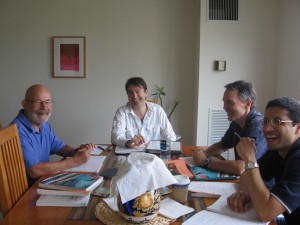Falsos Amigos
 Literally translated a “falso amigo” in Spanish means a “false friend”—when referring to grammar, it may not make much sense in English, but in Spanish it is used to refer to words that are alike in form but vary in meaning. We, Spanish teachers, love “falsos amigos” because they give us a chance to identify a problem and help students improve.
Literally translated a “falso amigo” in Spanish means a “false friend”—when referring to grammar, it may not make much sense in English, but in Spanish it is used to refer to words that are alike in form but vary in meaning. We, Spanish teachers, love “falsos amigos” because they give us a chance to identify a problem and help students improve.
A “falso amigo”, or in English a “false cognate”, is a word that “sounds” more or less the same in both English and Spanish, but whose meanings and usages are often very different. The most commonly referenced example of this is the mistaken use of the Spanish phrase: “estar embarazada” for the English “to be embarrassed”.
I remember several years ago, as I was on my way to meet Pam and Todd, long-time students of mine, to have our weekly Spanish class, I received an urgent phone call from home–it was my wife. She was calling to ask me to come home quickly to take her to the emergency room. She was pregnant; “embarazada” as we say in Spanish. I called Pam to tell her—in Spanish—what was going on; she understood perfectly that the class was to be rescheduled since I had to take Valeria, my wife, to the hospital, but was confused as to why Valeria was “embarrassed” about the situation, because as she noted, “Everybody has the right to get sick!” The next class with Pam and Todd was fun but also a milestone. We laughed a lot about the misunderstanding and began to practice every week with a “falso amigo”.
Though it is a notable “falso amigo” to use “estar embarazada” for the English “to be embarrassed”, in the hundreds and hundreds of hours I have invested in teaching, I have only heard it misused a handful of times. Let´s take a look at another more commonly used “falso amigo”, and let’s try it in Spanish:
“Pedí un café en Starbucks pero cuando iba a pagar me realicé de que no tenía dinero.”
“Los niños no se realizan de que el dinero no es gratis.”
In English the verb “to realize” has two meanings: 1. “to become aware of” or “appreciate” and 2. “to accomplish” or “to bring to fruition”. Conversely, in Spanish the verb “realizar” has only one use—similar to the latter in English—meaning “to carry out or execute” as in a task. Therefore, it is not correct to use “realizar” for the first meaning of “to realize”, as it is a “falso amigo”. To properly express the meaning of “to realize” in Spanish, we must use “darse cuenta (de que)”. For example:
“Pedí un café en Starbucks pero cuando iba a pagar me di cuenta de que no tenía dinero.”
“Los niños no se dan cuenta de que el dinero no es gratis.”
“Juan buscaba su bolígrafo sin darse cuenta de que lo tenía en la mano”
Try it out!
Send us up to three of your own examples in Spanish using the expression “darse cuenta (de que)” and we will do our best to correct them and send our feedback to you in a few days. Email examples to: nadieesperfecto@spanishtutordc.com. We will post the best examples on our blog.
Check back here every Friday to find new articles. You will have a chance to apply your Spanish skills by sending us your own sample sentences each week.

